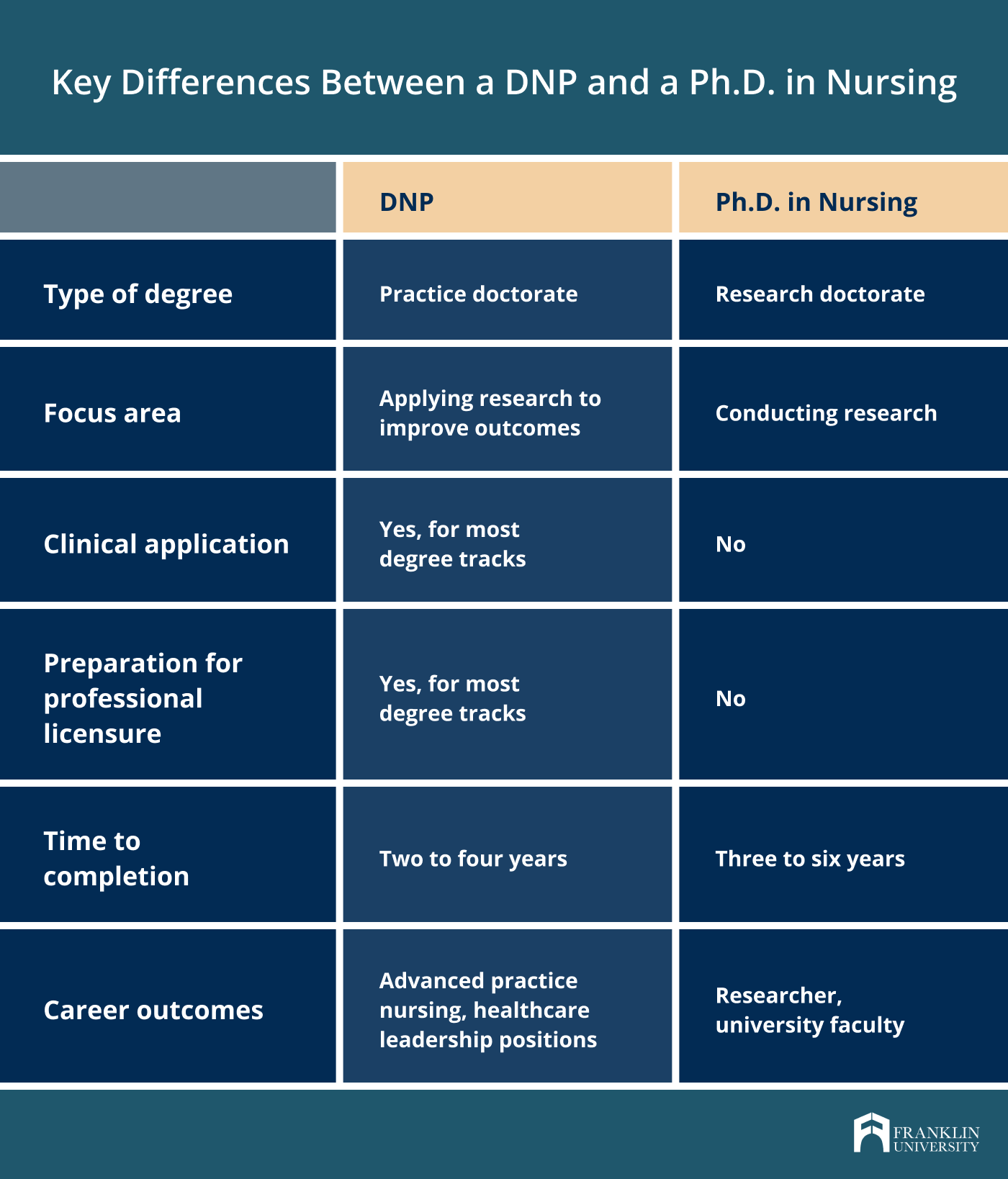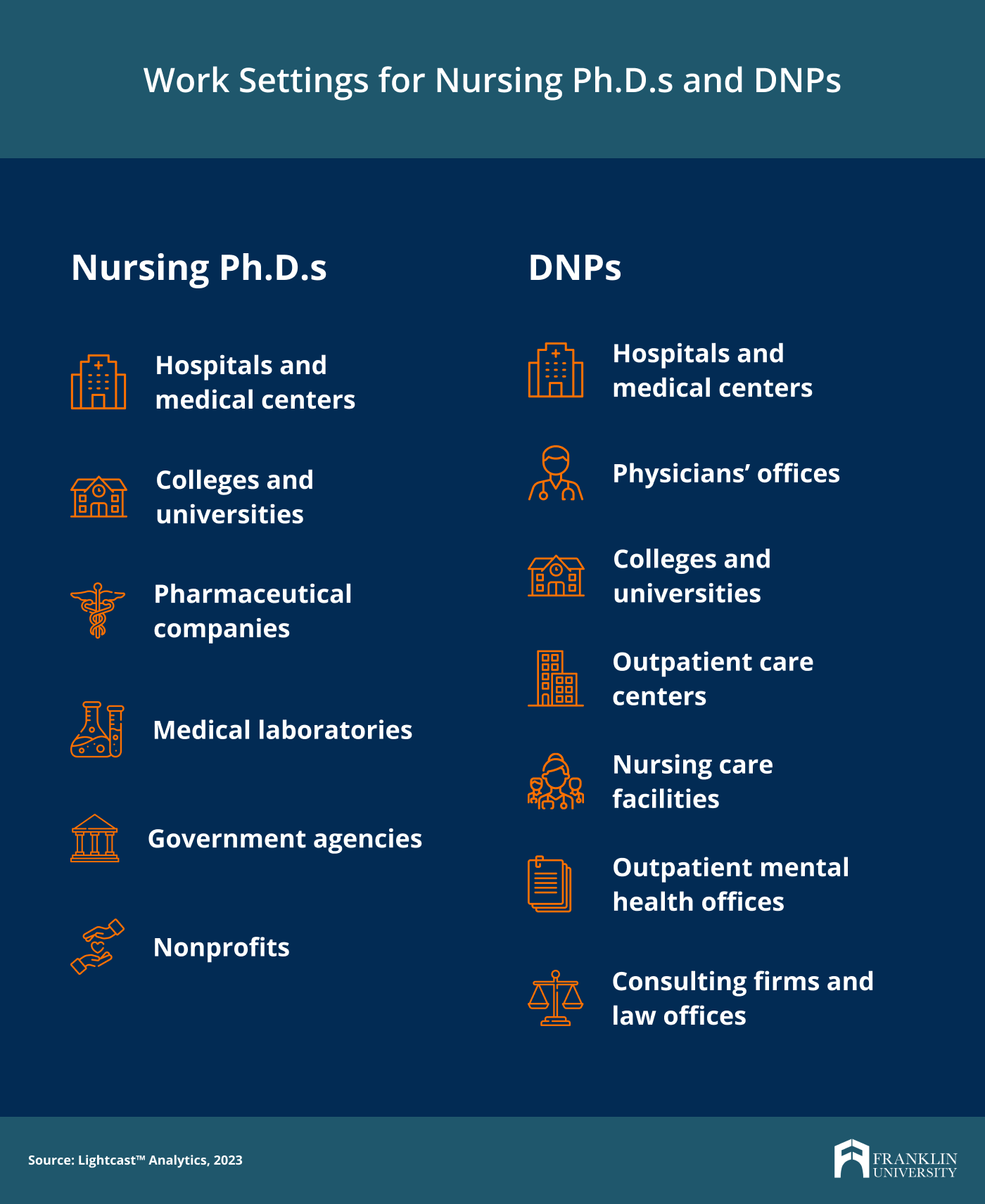Request Information
We're Sorry
There was an unexpected error with the form (your web browser was unable to retrieve some required data from our servers). This kind of error may occur if you have temporarily lost your internet connection. If you're able to verify that your internet connection is stable and the error persists, the Franklin University Help Desk is available to assist you at helpdesk@franklin.edu, 614.947.6682 (local), or 1.866.435.7006 (toll free).
Just a moment while we process your submission.

DNP vs. Ph.D. in Nursing: Which Degree Is Right for You?
If you’re a nurse hoping to grow your impact in the field and advance your career, pursuing a doctoral-level degree may help you develop your abilities and reputation as an expert. But first, you’ll have an important choice to make. Nurses have two doctoral paths to choose from – Ph.D. in Nursing and Doctor of Nursing Practice (DNP) – and though the degrees are equal in stature, they are very different in both their areas of focus and the careers they might lead to.
What should you know about each degree, and how can you decide which path is right for you?
What Are the Differences Between a DNP and a Ph.D. in Nursing?
DNP and Ph.D. in Nursing programs have a number of significant differences. The most important areas in which they diverge include:
1. Research vs. Practice
A Ph.D. in Nursing is a research doctorate, while a DNP is a practice doctorate. Nurses with Ph.D.s typically conduct scientific and nursing research, which they share with the field through writing publications, presenting to their peers, and holding academic positions. DNPs, on the other hand, learn to parse the latest research for actionable insights that they can apply in the clinical setting and leadership roles to improve the healthcare system and drive better patient outcomes.
2. Academic Requirements
Ph.D. students must complete and present a dissertation based on original research that advances the nursing field. This involves designing a project, collecting and analyzing data, identifying significant findings and distilling that information into a report. As a result, Ph.D. students typically develop a deep but narrow body of knowledge.
DNP programs also include a capstone project, but instead of conducting research, students usually apply existing research to design and implement a quality improvement within a real-world healthcare setting. While DNP students don’t specialize as intensely as Ph.D. students, they can develop a broader understanding of the healthcare field and nursing practice.
3. Patient Care and Clinical Experience
Both nursing Ph.D. and DNP programs require nursing licensure for admission (except for a few programs that combine entry-level nurse preparation with a DNP). However, nursing Ph.D. programs do not involve patient care. If you choose a DNP program with a clinical track, on the other hand, you will need to complete significant clinical hours within your chosen specialty. This means that Ph.D. programs do not lead to professional licensure, while many DNP programs prepare graduates for licensure and work as advanced practice nurses.
4. Time to Completion
Ph.D. programs typically take anywhere from three to six years to complete, depending on the program and the pace of the student’s research process. DNP programs usually take between two and four years to complete, depending on the student’s prior education and the track they select.
5. Graduate Outcomes
Ph.D. graduates work in research in settings including universities, pharmaceutical companies and government agencies. They might design and run medical studies, educate future nurses, or take on administrative roles related to nursing.
DNPs, on the other hand, often work in clinical settings or in leadership positions in healthcare organizations or related industries.
Get a FREE guide to help you advance your career, featuring helpful advice and thoughtful insights from nursing experts.

What Are the Career Options with a DNP?
DNPs can choose from many different careers depending on their interests and the academic track they pursue. These include nonclinical leadership roles as well as policy and teaching positions. Sample roles (with median advertised salaries from Lightcast Analytics, a leading labor research firm), include:
Nurse educator
Median salary: $92,500
Nursing informatics analyst
Median salary: $103,200
Chief nursing officer
Median salary: $125,200
Medical policy analyst
Median salary: $129,800
Other DNPs choose to remain in patient care roles but grow their careers as advanced practice nurses. This route requires additional licensure. Potential roles include:
Clinical nurse specialist
Median advertised salary: $96,100
Certified nurse midwife (CNM)
Median advertised salary: $122,200
Nurse practitioner
Median advertised salary: $127,900
Certified registered nurse anesthetist (CRNA)
Median advertised salary: $204,500
What Are the Career Options with a Ph.D. in Nursing?
Nursing Ph.D. programs are primarily intended for nurse scientists who wish to build careers in research or academics. Some nursing Ph.D.s, especially those with more clinical experience, go on to leadership roles within healthcare organizations similar to those DNPs might pursue. Nursing Ph.D.s who hold RN licensure may continue to practice as bedside nurses, but the degree does not prepare graduates for advanced practice roles. Potential positions include:
Nurse scientist or researcher
Median advertised salary: $67,800
Nursing professor
Median advertised salary: $73,100
Nurse educator
Median salary: $92,500
Chief nursing officer
Median salary: $125,200
It’s important to note that specific salaries and positions can differ a great deal since nurse scientists may work in settings ranging from government agencies to universities to pharmaceutical companies.

Is a DNP or a Ph.D. in Nursing Right for You?
Ultimately, the choice between a Ph.D. and a DNP comes down to a straightforward question: do you want to conduct research or apply it to improve clinical practice and outcomes? Both paths can lead to rewarding, impactful careers that benefit patients and healthcare systems.
If you wish to provide patient care, a DNP is the logical choice. It’s also typically a more straightforward pathway to leadership roles within healthcare organizations. However, if you wish to conduct studies, write research papers and present your findings to the field, a Ph.D. may be the option for you.
Explore DNP Programs at Franklin
If your career goals make a DNP program a better fit, consider Franklin University.
Franklin’s flexible, online DNP offers both clinical and nonclinical options, as well as a BSN to DNP pathway for registered nurses who do not have a master’s degree in nursing.
With flexible tuition, low fees and a generous transfer credit policy, you can earn your DNP for less at Franklin while gaining a valuable credential that can open doors.
Learn more about Franklin’s DNP programs.





